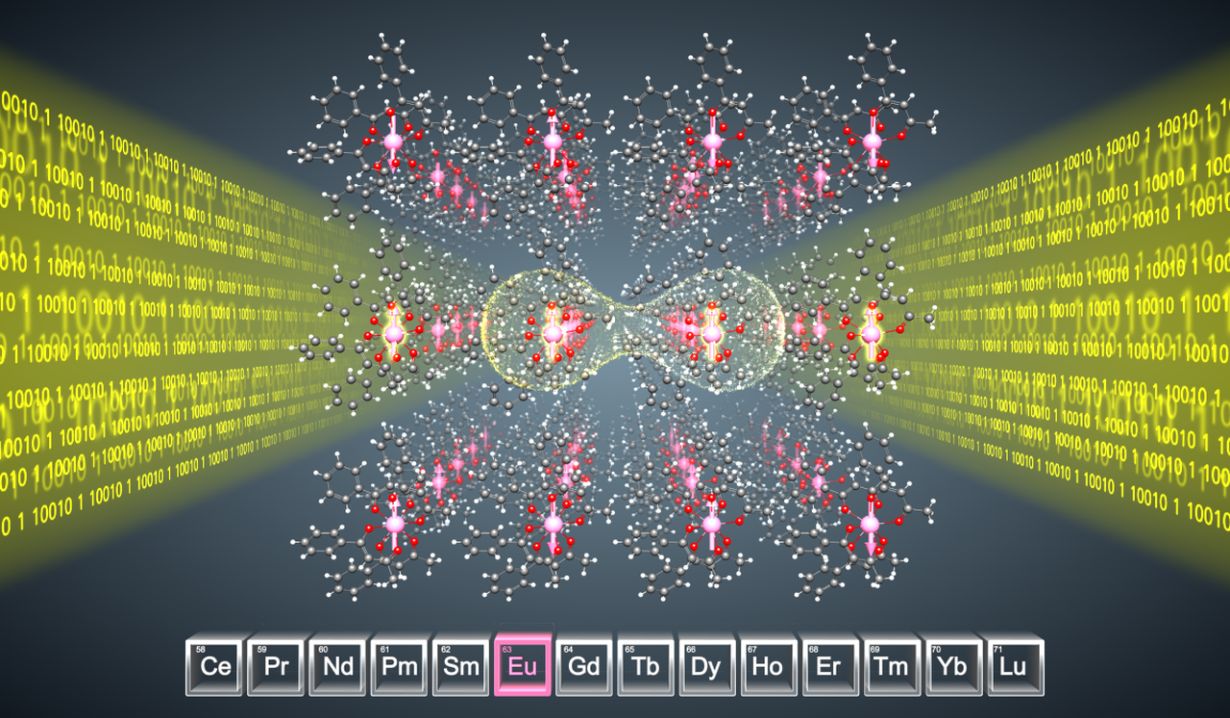Light can be used to distribute quantum information rapidly, efficiently, and in a secure, tap-proof manner. Researchers of Karlsruhe Institute of Technology (KIT), Strasbourg University, Chimie ParisTech and the French national research center CNRS have now achieved major progress in the development of materials for processing quantum information with light. In Nature, they present a europium (europium belongs to the rare-earth metals) molecule with nuclear spins, by means of which an effective photon-spin interface can be produced.
Quantum information will revolutionize not only research and industry, but also our everyday life. Among others, it promises enormous progress in the simulation of materials and processes, which will push the development of new medical substances, the improvement of batteries, transport planning, and secure information and communication. A quantum bit (qubit) can assume many different states between 0 and 1 at the same time. This so-called quantum superposition enables massively parallel processing of data. As a result, computing capacity of quantum computers will increase exponentially compared to digital computers. To carry out computing operations, however, the superposition states of a qubit have to persist for a certain time. In quantum research, this is referred to as coherence lifetime. Nuclear spins, i.e. angular momentums of atomic nuclei, in molecules enable superposition states with long coherence lifetimes, because nuclear spins are shielded well from the environment and protect qubits against external impacts.
Effective Light/Nuclear Spin Interface
“For practical applications, we have to be able to store, process, and distribute quantum states,” says Professor Mario Ruben, Head of the Molecular Quantum Materials Group of KIT’s Institute for Quantum Materials and Technologies (IQMT) and of the European Center for Quantum Sciences – CESQ of Strasbourg University. “For this, we have now identified a promising novel type of material: A europium molecule containing nuclear spins. Europium belongs to the rare-earth metals.” The team of Professors Mario Ruben and David Hunger from the IQMT and Dr. Philippe Goldner from the École nationale supérieure de Chimie de Paris (Chimie ParisTech – PSL University; Centre national de la recherche scientifique; CNRS) present this innovative material in Nature.
The molecule is structured such that it exhibits luminescence in case of laser excitation. This means that it emits photons carrying the nuclear spin information. By means of specific laser experiments, an effective light/nuclear spin interface can be produced. The work covers the addressing of nuclear spin levels with the help of photons, coherent storage of photons, and the execution of first quantum operations.
High Density of Qubits
To execute useful quantum operations, many qubits entangled by quantum mechanics are required. For this, the qubits must interact with each other. The researchers from Karlsruhe, Strasbourg, and Paris have proved that europium ions in molecules can couple via electric stray fields, thus enabling future entanglement and, hence, quantum information processing. As the molecules are structured with atom precision and arrange in exact crystals, a high qubit density can be reached.
Another aspect relevant to practical applications is the addressability of individual qubits. Optical addressing increases the readout speed and interfering electrical feeds can be prevented. Frequency separation allows to individually address a number of molecules. Compared to previous projects, the work reported here reaches an about thousand times better optical coherence in a molecular material. In this way, nuclear spin states can be manipulated optically in a specific way.
A Step towards the Quantum Internet
Light is also suited for distributing quantum information over larger distances to connect quantum computers or to securely transmit information. This might be achieved by future integration of the novel europium molecule in photonic structures to enhance transitions. “Our work represents an important step towards quantum communication architectures with rare-earth molecules as a basis for a quantum internet,” Professor David Hunger, IQMT, says
Original Publication
Diana Serrano, Kuppusamy Senthil Kumar, Benoît Heinrich, Olaf Fuhr, David Hunger, Mario Ruben, Philippe Goldner: Rare-earth Molecular Crystals with Ultra-narrow Optical Linewidths for Photonic Quantum Technologies. Nature, 2021. DOI: 10.1038/s41586-021-04316-2
https://www.nature.com/articles/s41586-021-04316-2
In close partnership with society, KIT develops solutions for urgent challenges – from climate change, energy transition and sustainable use of natural resources to artificial intelligence, sovereignty and an aging population. As The University in the Helmholtz Association, KIT unites scientific excellence from insight to application-driven research under one roof – and is thus in a unique position to drive this transformation. As a University of Excellence, KIT offers its more than 10,000 employees and 22,800 students outstanding opportunities to shape a sustainable and resilient future. KIT – Science for Impact.

